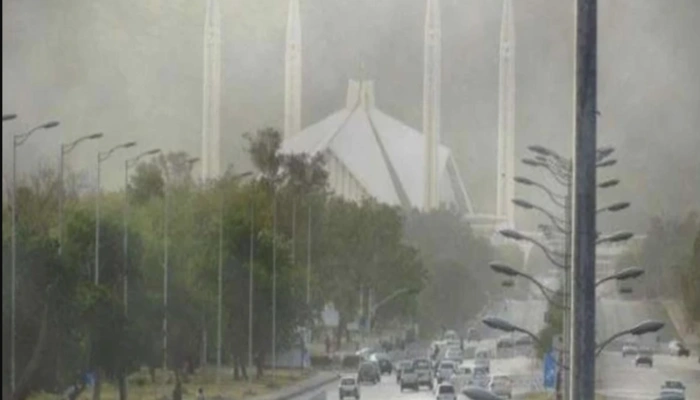Islamabad’s residents are struggling with hazardous air quality as pollution levels remain alarmingly high. The Pakistan Environmental Protection Agency (Pak-EPA) has reported that the city’s Air Quality Index (AQI) has fluctuated between “unhealthy” and “very unhealthy” over the past two months. This situation, fueled by increasing construction projects and vehicular emissions, has raised serious concerns about public health.
Construction Projects Worsen Air Pollution
Large-scale construction in the capital has emerged as a major contributor to deteriorating air quality. Projects such as high-rise developments along Blue Area, the Park Road extension, and major interchanges like Serena and PTCL have caused a sharp increase in dust and emissions. Heavy machinery, including dump trucks and excavators, operates around the clock with little regard for pollution control, pushing AQI levels to an average of 182 micrograms per cubic meter—far exceeding the permissible limit of 35 micrograms.
Vehicular Emissions and Brick Kilns Add to the Crisis
Vehicular emissions have compounded the problem, with outdated vehicles emitting high levels of pollutants. Additionally, brick kilns on the city’s outskirts, which have yet to adopt environmentally friendly zigzag technology, continue to release harmful particulates. Pollution from neighboring Rawalpindi further contributes to the rising levels of PM2.5, the fine particulate matter most harmful to human health.
Public Health at Risk
The impact of Islamabad’s polluted air is evident in rising health complaints. Residents report symptoms such as coughing, sneezing, and fatigue, particularly among children, the elderly, and asthma patients. Dr. Rubia Usman, a general physician, explains that polluted air does more than harm the lungs. It affects all organs by reducing oxygenation, leading to fatigue, worsened asthma, and even heart disease.
A resident, Mahwish Khan, shared how her children’s health deteriorated upon returning to Islamabad after a vacation. “They developed allergies and persistent coughing despite a healthy diet. We realized it was the air they were breathing,” she said.
Efforts to Monitor and Mitigate Pollution
In response to the worsening situation, Pak-EPA plans to install air monitoring units across six to seven locations in the city to track pollution levels. The agency has recommended practical measures, such as frequent water sprinkling at construction sites, to reduce dust. It has also urged authorities to stop the practice of burning garbage in public bins, which significantly worsens air quality.
Read: Sarajevo Suffers as Fog and Smog Push Air Quality to Hazardous Levels
Call for Action
To combat the crisis, Pak-EPA has repeatedly advised residents to take precautions. Vulnerable groups, including children and the elderly, are encouraged to wear masks outdoors. The agency has also appealed for stricter enforcement of environmental regulations and the adoption of cleaner technologies in industrial practices.
Islamabad’s air pollution crisis is a wake-up call for immediate and effective measures. Without intervention, the city’s residents will continue to face serious health risks, underscoring the urgent need for sustainable urban planning and pollution control initiatives.
Follow Day News on Google News, Instagram, YouTube, Facebook, Whats App, and TikTok for latest updates
